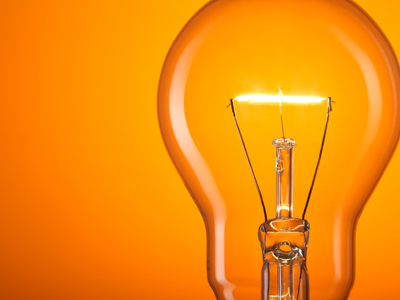
Ask the AI Tutor
Need help with Electricity - Current, Charge and Power? Ask our AI Tutor!
AI Tutor - Lucy
Connecting with Tutor...
Please wait while we establish connection

In a filament lamp, most of the energy is lost as heat.
Electricity - Current, Charge and Power
In this GCSE Physics quiz you will revise current, charge and power, using circuit examples to link equations with real components, calculations and exam-style questions.
1 .
If a charge flows through a resistor, which of the following happens to the resistor?
It gets colder
It gets hotter
It becomes positively charged
Nothing
A resistor makes it harder for the electrons to pass and some of their energy is transferred into heat by the resistor
2 .
In a filament lamp, in what form is most of the energy lost?
Heat
Sound
Kinetic energy
Radio waves
The filament is a resistance wire that is designed to become so hot that it emits energy in the visible light part of the spectrum
3 .
What is power?
The number of repetitions of squats a body-builder can perform
The number of cylinders in a car
The rate at which energy is absorbed
The rate at which energy is transferred
In everyday language, power can have several meanings but in physics, it always means the same thing whether it is in an electrical or a mechanical context
4 .
What is the formula for power?
P = E⁄t
P = t⁄E
P = E⁄2t
P = 2E⁄t
If the units you use for energy and time are joules and seconds, the power will be in watts
5 .
Calculate the power of an appliance that uses 1000 joules of energy in 5 seconds.
100 W
200 W
300 W
400 W
Power is the rate at which energy is transferred therefore you need to divide the energy by the time during which it was being transferred. 1000 divided by 5 gives you the answer of 200. Since the energy transferred is in joules and the time in seconds, the power has been calculated in watts
6 .
Power, potential difference and current are correctly related by which equation?
P = I x V
P = 2I x V
P = I⁄V
P = I⁄2V
This is a very handy equation - make sure you learn it well and can rearrange it to work out the current or potential difference
7 .
What is the voltage of an appliance if it uses 200 J per second when supplied with a current of 5 A?
10 V
20 V
30 V
40 V
Always ensure you give units in your answer. Marks can be lost for missing them out!
8 .
Which equation correctly shows the relationship between energy transferred, voltage and charge?
E = V x Q
E = 2V x Q
E = V⁄Q
E = Q⁄V
You can substitute current and power in place of voltage if it is not given in a question. You need to use this formula and combine it with the one given in question 6
9 .
What is the energy transferred if the voltage is 5 V and the charge is 10 C?
50
25
50 J
25 J
Whilst you would get a mark for answering 50 you would lose a mark for not giving units with your answer. If you are struggling to calculate an answer to a numerical question, always put a number with the correct units! At least you will get a mark for using the correct units
10 .
What size of fuse would be required for a 230 V, 500 W heater?
3 A
5 A
13 A
1 A
To find out the most appropriate fuse to use, calculate the current flowing through the appliance. The fuse should have a rating slightly higher than the current
**Unlimited Quizzes Await You! 🚀**
Hey there, quiz champ! 🌟 You've already tackled today's free questions.
Ready for more?
Ready for more?
🔓 Unlock UNLIMITED Quizzes and challenge yourself every day. But that's
not all...
not all...
🔥 As a Subscriber you can join our thrilling "Daily Streak" against other
quizzers. Try to win a coveted spot on our Hall of Fame Page.
quizzers. Try to win a coveted spot on our Hall of Fame Page.
Don't miss out! Join us now and keep the fun rolling. 🎉
**Unlimited Quizzes Await You! 🚀**
Hey there, quiz champ! 🌟 You've already tackled today's free questions. Ready for more?
🔓 Unlock UNLIMITED Quizzes and challenge yourself every day. But that's not all...
🔥 As a Subscriber you can join our thrilling "Daily Streak" against other quizzers. Try to win a coveted spot on our Hall of Fame Page.
Don't miss out! Join us now and keep the fun rolling. 🎉






